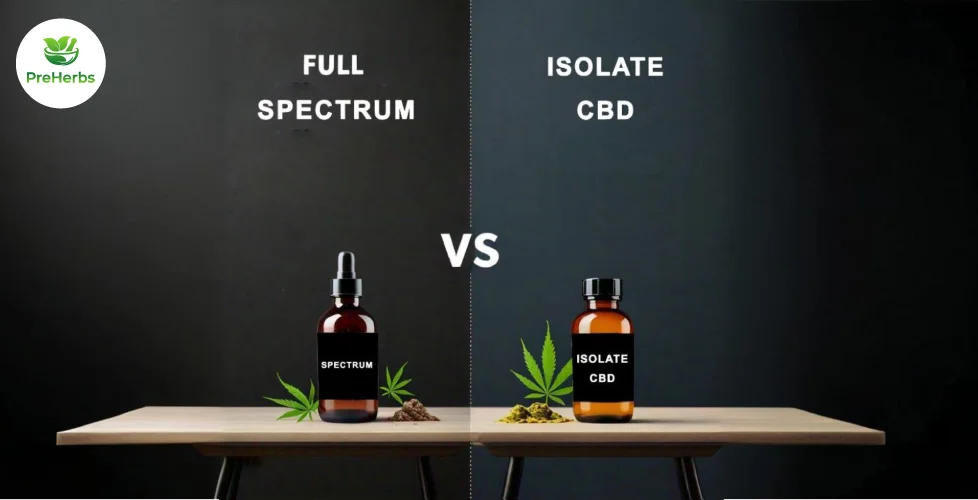In recent years, CBD (cannabidiol) has garnered significant attention for its potential therapeutic benefits, ranging from alleviating anxiety to reducing inflammation. As the market for cannabidiol products grows, consumers are faced with various options, primarily two distinct types of CBD: full-spectrum and isolate. Understanding the differences between these two forms of cannabidiol can help you make informed decisions about which product best suits your needs. In this comprehensive blog post, we’ll delve into the nuances of full-spectrum and isolate cannabidiol, exploring their benefits, drawbacks, and ideal uses.
Related blog: How to Choose the Right CBD Dosage for Your Need
What is CBD?
Before diving into the specifics of full-spectrum and isolating cannabidiol, it’s essential to understand what CBD is. cannabidiol is a non-psychoactive compound found in the Cannabis sativa plant. Unlike its more famous counterpart, THC (tetrahydrocannabinol), cannabidiol does not produce a “high” and is primarily used for its potential therapeutic properties. cannabidiol interacts with the body’s endocannabinoid system (ECS), which plays a crucial role in regulating various physiological processes, including mood, pain perception, and immune response.
What is Full-Spectrum CBD?
Full-spectrum CBD refers to a type of cannabidiol oil that contains a wide range of cannabinoids and other compounds found in the cannabis plant. This includes cannabidiol, trace THC (up to 0.3%), other cannabinoids (e.g CBG, CBN), terpenes, and flavonoids.
Benefits of Full-Spectrum CBD
Related blog: How to Incorporate CBD into Your Wellness Routine
- Entourage Effect: The primary benefit of full-spectrum cannabidiol is the “entourage effect.” This concept suggests that the various compounds in the cannabis plant work synergistically to enhance each other’s effects.
- Enhanced Therapeutic Potential: Research indicates that full-spectrum cannabidiol may offer enhanced therapeutic benefits compared to cannabidiol isolate.
- Broad Range of Uses: Because of its complex profile, full-spectrum cannabidiol might be beneficial for a wider array of health issues, including chronic pain, anxiety, and sleep disorders.
Related blog: How to Store CBD Products for Maximum Freshness
Drawbacks of Full-Spectrum cannabidiol
While full-spectrum cannabidiol offers a range of benefits through the entourage effect, it also comes with certain drawbacks.
- Trace THC: Full-spectrum cannabidiol has trace THC that may cause positive drug tests or unwanted effects, so those sensitive to THC should consider this.
- Legal and Regulatory Concerns: The presence of THC, even in minimal amounts, can sometimes cause legal or regulatory issues, depending on local laws and regulations.
What is cannabidiol Isolate?
CBD isolate is the purest form of cannabidiol, containing 99% pure cannabidiol. It is isolated from all other cannabinoids, terpenes, and plant compounds. The result is a crystalline powder or oil that contains only cannabidiol.
Benefits of CBD Isolate
cannabidiol isolate offers purity and precise dosing but lacks the entourage effect of full-spectrum cannabidiol, potentially limiting its overall benefits.
- Purity: CBD isolate offers pure cannabidiol, ideal for those wanting benefits without any THC or other cannabinoids.
- No Risk of Drug Test Issues: Since cannabidiol isolate contains no THC, it eliminates the risk of testing positive for THC in drug screenings. This makes it a suitable option for athletes, professionals, or anyone concerned about drug testing.
- Controlled Dosing: With only cannabidiol present, dosing can be more straightforward. Users can accurately gauge their cannabidiol intake without worrying about the influence of other cannabinoids or compounds.
Related blog: The Science Behind CBD: How It Works in the Body
Drawbacks of cannabidiol Isolate
CBD isolate offers purity and precise dosing but lacks the entourage effect, limiting its effectiveness compared to full-spectrum cannabidiol.
- Lack of Entourage Effect: CBD isolate lacks the entourage effect, so it may be less effective for some conditions than full-spectrum cannabidiol. The absence of other cannabinoids and terpenes might limit its therapeutic potential.
- Limited Therapeutic Scope :Cannabidiol isolate lacks other cannabinoids and terpenes, so it may address fewer health issues than full-spectrum cannabidiol.. Users may find it less effective for complex conditions requiring a more comprehensive approach.
Choosing Between Full-Spectrum and Isolate CBD
The choice between full-spectrum and isolate CBD largely depends on individual preferences and health goals:
- Opt for Full-Spectrum cannabidiol if you are seeking the potential benefits of the entourage effect, are comfortable with trace amounts of THC, and want a broader range of therapeutic benefits.
- Choose CBD Isolate if you prefer a pure form of cannabidiol without any THC or other cannabinoids, are concerned about drug testing, or need precise control over your cannabidiol dosage.
Related blog: Understanding the Legal Status of CBD in 2024
Conclusion
Both full-spectrum and isolated CBD have their own sets of benefits and drawbacks. Understanding these differences can help you make an informed choice based on your health needs, sensitivities, and preferences. Both full-spectrum CBD and cannabinoid isolate can uniquely support your wellness journey. Full-spectrum cannabinoid offers synergistic effects, while CBD isolate provides purity. You can choose the type that best fits your needs.



